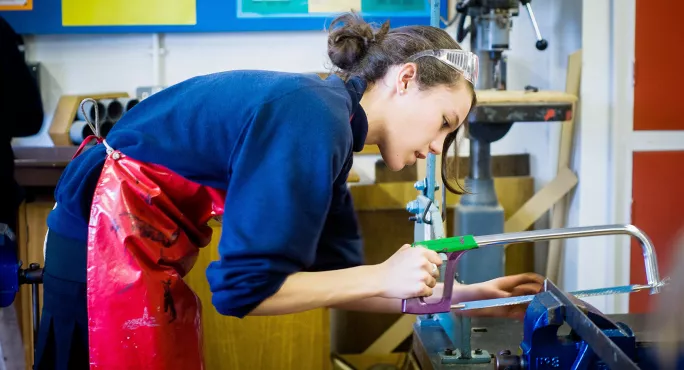Wales to introduce vocational GCSEs

Wales is set to introduce a new brand of qualification - vocational GCSEs or VCSEs - as the country overhauls its offer for 14- to 16-year-olds to chime with the new curriculum.
Following a public consultation, Qualifications Wales has published its decisions on qualifications that will be available to 14- to 16-year-olds, alongside new Made-for-Wales GCSEs.
The changes will see the introduction of new bilingual, work-related VCSEs (Vocational Certificate of Secondary Education) as well as new skills-based qualifications.
Same worth as GCSEs
Qualifications Wales says the idea behind the new VCSEs - which will replace Btecs and other vocational qualifications - is that they will sit alongside GCSEs.
Ultimately, it is hoped they will have the same value and the same worth; today’s report on the decisions taken by Qualifications Wales says the use of VCSE “can help with parity of value with GCSEs”.
Parity of esteem between academic and vocational qualifications has long been a thorny problem in many countries - the issue was also raised in Scotland in a recent review of its school qualifications.
- Background: New suite of Made-for-Wales GCSEs announced
- Related: What is Curriculum for Wales?
- News: 40% persistently absent in some Welsh secondaries
- Analysis: Wales’ Pisa results have ‘an air of inevitability’
VCSEs will be the same level and size as GCSEs, but will have different content and different assessments.
The new VCSE qualifications will cover at least 13 subject areas, including: travel and tourism; animal care; hair and beauty; and business, accounting and finance.
The new suite of vocational and skills-based qualifications - including VCSEs - will be taught in Welsh schools from September 2027, whereas new Made-for-Wales GCSEs will be taught in schools from September 2025 or, in some cases, September 2026.
By 2027, along with new Made-for-Wales GCSEs, learners in Wales aged 14-16 will be able to choose from:
- VCSEs
- Foundation qualifications
- Skills for Life and Skills for Work qualifications
- Personal Project qualification
The Skills for Work qualifications include topics such as applying for jobs, interview techniques and work experience. Skills for Life qualifications include topics such as financial literacy and basic first aid, which learners reported they wanted to learn to help them progress in life.
Foundation qualifications, meanwhile, sit below VCSEs and GCSEs for those learners not yet ready to work at that level.
The Personal Project qualification will be available from entry level to level 2. It has been designed to allow every learner to study a topic of their choice, independently and in depth.
Mixing and matching
The idea is that learners in Wales will mix and match the different qualifications on offer for 14- to 16-year-olds, to best meet their needs and ambitions.
Cassy Taylor, director of qualifications policy and reform at Qualifications Wales, said the new Made-for-Wales qualifications - including the GCSEs already in development - represented “the biggest transformation of 14-16 qualifications in a generation”.
She added: “It will mean that all learners, whatever their interest, aptitude or ability, will be able to gain recognition and reward for what they know, understand and can do.
“Armed with these new qualifications, they’ll be able to progress from the Curriculum for Wales to the next stage of learning and form a basis for their own personal success.”
NAHT Cymru national director Laura Doel welcomed the new suite of qualifications, saying existing vocational qualifications were in need of review.
However, she also sounded a note of caution about workload implications for school, as well as “how these qualifications and GCSEs will interlink with the new Curriculum for Wales, and their suitability in meeting the needs of students who move to other parts of the UK to study or work”.
She said: “Discussions over these issues are ongoing between unions, [exam board] WJEC and Qualifications Wales to ensure learners and staff are not disadvantaged.”
Register with Tes and you can read two free articles every month plus you'll have access to our range of award-winning newsletters.
Keep reading with our special offer!
You’ve reached your limit of free articles this month.
- Unlimited access to all Tes magazine content
- Save your favourite articles and gift them to your colleagues
- Exclusive subscriber-only stories
- Over 200,000 archived articles
- Unlimited access to all Tes magazine content
- Save your favourite articles and gift them to your colleagues
- Exclusive subscriber-only stories
- Over 200,000 archived articles
topics in this article



